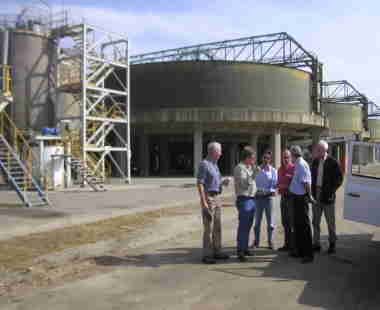Partners look to resurrect Spanish U mining
![]() Australian company Berkeley Resources has announced that it will be undertaking a feasibility study with a view to restarting uranium mining at several Spanish deposits under a cooperation agreement with Spain's fuel cycle company Enusa.
Australian company Berkeley Resources has announced that it will be undertaking a feasibility study with a view to restarting uranium mining at several Spanish deposits under a cooperation agreement with Spain's fuel cycle company Enusa.
Australian company Berkeley Resources has announced that it will be undertaking a feasibility study with a view to restarting uranium mining at several Spanish deposits under a cooperation agreement with Spain's fuel cycle company Enusa.
 |
| Quercus plant: out of mothballs? (Image: Berkeley Resources) |
According to a 32-page Australian Securities Exchange (ASX) announcement, Berkeley's objective is to generate a total resource base for the project of over 65 million pounds U3O8 from Enusa's assets as well as its own resources in Salamanca Province. The Enusa assets include three "advanced" deposits – Sageras, Zona M and Minas D – with historical resource estimates of 17 million pounds U3O8 which have already been studied extensively and are extensions of the previously mined Fe deposit close to the Quercus plant. Also included are the less advanced but extensively drilled Alameda and Esperanza deposits, for which Berkeley has an exploration target of 28-29 million pounds U3O8 based on Enusa figures. These, along with Berkeley's own deposits, could provide further feed for the mill. Berkeley's Salamanca-1 deposit has JORC-compliant calculated inferred and indicated resources of 16.9m lbs of U3O8 at an average grade of 563ppm.
Berkeley is to pay Enusa an initial deposit of €5 million ($6.5 million) to acquire its database on the assets before embarking on the feasibility study, which it expects to take 18 months. After that, Berkeley would be able to acquire a 90% interest in a joint venture company owning the Enusa assets for a further €20 million ($26 million). Up until the start of the feasibility study Enusa would be able to increase its share in the joint venture up to 49%. The Spanish company will retain a royalty on production from the State Reserves and a lease fee representing 2.5% of the value of any uranium produced through the Quercus plant regardless of source.
"Considerable potential"
Spain's eight nuclear reactors generate a fifth of its electricity but has relied on imports to meet its uranium demand since mining ended at the Saelices el Chico mine in 2000 when uranium prices were much lower than today. The Quercus processing plant has been under care and maintenance since the last domestic uranium production was processed in 2003. According to Berkeley it is in excellent condition, and although it lacks a comminution (crushing and grinding) circuit would offer major capital cost and time savings compared to building a new plant.
"Berkeley… believes there is considerable potential to re-commence mining in Salamanca Province by optimising throughput from the various sources of feedstock," the announcement notes.
Berkeley bills itself as "the premier uranium explorer in the Iberian peninsula", although Canadian company Mawson Resources also has uranium exploration interests in Spain. Former uranium producer Enusa manages the supply of enriched uranium for Spain's nuclear plants and produces reactor fuel for domestic use and export at its Juzbado plant, and has interests in African uranium production and the Eurodif uranium enrichment facility in France.
_49098.jpg)
_57190.jpg)
_70526.jpg)
_75453.jpg)






_50521.jpg)

